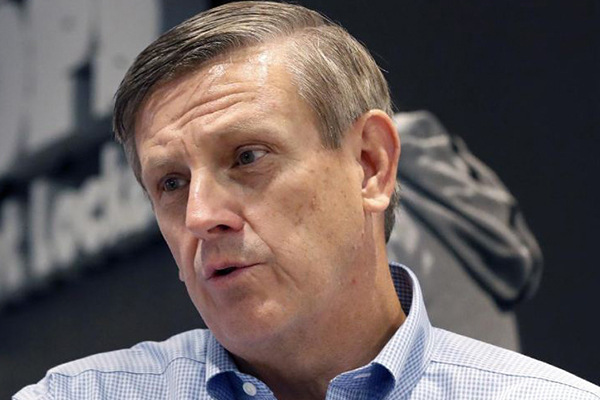 |
|
Foot Locker CEO and President Dick Johnson. [Photo provided to China Daily] |
Start with the shoes but move on from there-that's the plan at Foot Locker Inc.
Long known for its sneakers, the company is reorganizing its stores to further highlight top brands, designating areas to showcase trends, and adding more displays of full sports gear to encourage broader shopping.
At the chain's redesigned midtown Manhattan flagship in New York that opened Tuesday, large digital signs display images of the shoes as well as social feeds like Twitter that mention the brand.
Larger areas are devoted to big brands like Puma and Under Armour. A section in its store is devoted to showcasing emerging fashions for women. And next to the store, there's an experiential area called NYC33 with a separate entrance that will host fashion shows and showcase other events and launches.
"Sneakers drive the apparel that goes with them," says Foot Locker CEO and President Dick Johnson. With all the other areas, the 13,000-square-foot store near Macy's stocks about 50,000 sneakers for men, women and kids at any given time.
The New York-based chain, which operates more than 3,400 stores under its own name as well as FootAction, Champs Sports, Lady Foot Locker and the new women's SIX: 02 among others, has benefited from the popularity of athletic sportswear for life beyond the gym.
It's aiming to push annual sales to $10 billion through 2020 from last year's $7.4 billion-in part by catering better to female customers. That all starts with sneakers, which represent about 80 percent of men's sales and 75 percent of the women's business.
Even with the liquidation of Sports Authority and its 500 stores, the field is a competitive one. Traditional rivals like Finish Line and Dick's Sporting Goods remain, while Lululemon is expanding to new areas like swimwear and menswear and its own suppliers like Under Armour and Nike are opening more stand-alone stores.
Nike's store at The Grove in Los Angeles features a Michael Jordan experience area where customers can test products through a digitally interactive dribbling drill that lasts 23 seconds, a tribute to the athlete's jersey number.
Under Armour is set to open a big store on Manhattan's Fifth Avenue on the site of the former FAO Schwarz store. It also penned a deal with department store chain Kohl's to supply its clothing and accessories across all the stores.
"This is not a fad," says analyst Matt Powell of the NPD Group, a leading global information company. He further says the athletic sportswear and footwear industry enjoyed one of its best years in 2015. It's about a $70-billion market, divided evenly between footwear and clothes. Athletic footwear sales increased by a mid-teen percentage last year.
Johnson says the newly designed store is important to separate itself from the competition and get its message out in New York, the epicenter of sneaker culture.
Among some of the hot sneakers: Adidas Pure Boost, the Stephen Curry shoe by Under Armor, and Nike Air's Huararaches.
"We realized long time ago that we couldn't be everything to everybody" in one store, said Johnson. "We have definitive brands and experiences."
The intent of the NYC33 area, for example, is not to sell stuff but to excite the customer.
From Tuesday to Sept 25, Foot Locker will stage fashion shows in that space highlighting singer Rihanna's new Fenty collection for Puma that includes $600 capes and $200 sweatshirts.
The line is exclusive to Foot Locker's SIX: 02 shop-within-a shop and Bergdorf Goodman for 24 hours before distribution goes wide Wednesday. The store also marks the debut of an area called The Collection at SIX: 02 that serves as a kind of lab that showcases emerging fashions for women.
"I'm excited about the new approaches" at the store, Powell said. "They have all the different brands and so many different looks for the consumer."
In its most recent quarter, Foot Locker's key revenue measure was up 4.7 percent, and profits rose nearly 7 percent. In contrast, its rival Finish Line announced this year that it would close 150 stores and replace its CEO. In the first quarter, the company's profits dropped 30 percent.
Foot Locker hadn't always been a strong performer. When former CEO Ken Hicks took over in 2009, the company was in a sales funk and he started closing stores.
Hicks also started adding specialty departments like Puma Labs, which offers exclusive merchandise, and House of Hoops, dedicated to high-end basketball shoes and gear. And Foot Locker, which never focused on catering to the specific shopping needs of women until a few years ago, is putting a lot of focus on that now.
It has 30 stand-alone SIX: 02 stores, targeting a trendy customer in her late 20s, and the newly redesigned Foot Locker store has devoted a boutique under the banner.
The company has gradually been closing its Lady Foot Locker stores and has approximately 140 now, which Johnson says is about right.
It's using Lady Foot Locker to target a younger customer than SIX: 02-ages 14 to 25, with more traditional sportswear like Nike and Adidas.
Foot Locker still has most of its stores in malls, but Johnson said he's not concerned about Macy's and other mall anchors closing locations.
"We're one of the few places in the mall that people line up for," he said.
Associated Press
